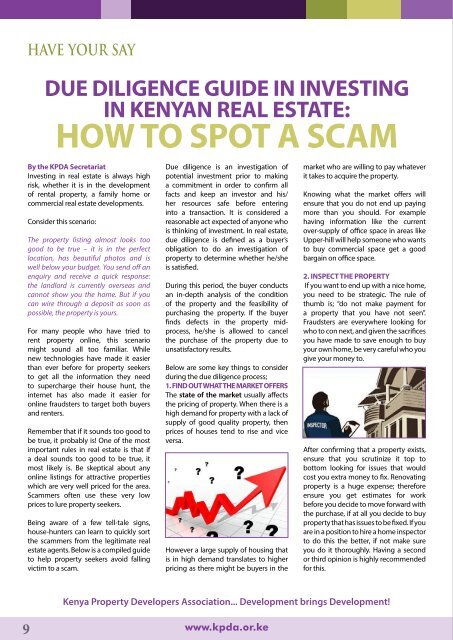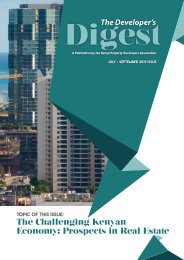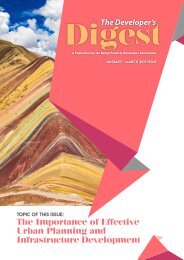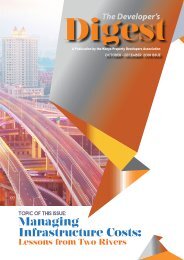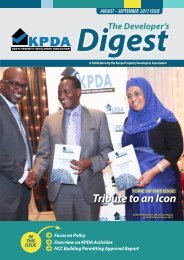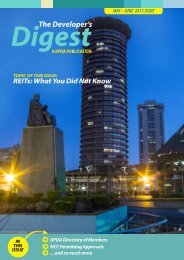The Developer's Digest, April - July 2017 Issue
You also want an ePaper? Increase the reach of your titles
YUMPU automatically turns print PDFs into web optimized ePapers that Google loves.
HAVE YOUR SAY<br />
HAVE YOUR SAY<br />
DUE DILIGENCE GUIDE IN INVESTING<br />
IN KENYAN REAL ESTATE:<br />
HOW TO SPOT A SCAM<br />
By the KPDA Secretariat<br />
Investing in real estate is always high<br />
risk, whether it is in the development<br />
of rental property, a family home or<br />
commercial real estate developments.<br />
Consider this scenario:<br />
<strong>The</strong> property listing almost looks too<br />
good to be true – it is in the perfect<br />
location, has beautiful photos and is<br />
well below your budget. You send off an<br />
enquiry and receive a quick response:<br />
the landlord is currently overseas and<br />
cannot show you the home. But if you<br />
can wire through a deposit as soon as<br />
possible, the property is yours.<br />
For many people who have tried to<br />
rent property online, this scenario<br />
might sound all too familiar. While<br />
new technologies have made it easier<br />
than ever before for property seekers<br />
to get all the information they need<br />
to supercharge their house hunt, the<br />
internet has also made it easier for<br />
online fraudsters to target both buyers<br />
and renters.<br />
Remember that if it sounds too good to<br />
be true, it probably is! One of the most<br />
important rules in real estate is that if<br />
a deal sounds too good to be true, it<br />
most likely is. Be skeptical about any<br />
online listings for attractive properties<br />
which are very well priced for the area.<br />
Scammers often use these very low<br />
prices to lure property seekers.<br />
Being aware of a few tell-tale signs,<br />
house-hunters can learn to quickly sort<br />
the scammers from the legitimate real<br />
estate agents. Below is a compiled guide<br />
to help property seekers avoid falling<br />
victim to a scam.<br />
Due diligence is an investigation of<br />
potential investment prior to making<br />
a commitment in order to confirm all<br />
facts and keep an investor and his/<br />
her resources safe before entering<br />
into a transaction. It is considered a<br />
reasonable act expected of anyone who<br />
is thinking of investment. In real estate,<br />
due diligence is defined as a buyer’s<br />
obligation to do an investigation of<br />
property to determine whether he/she<br />
is satisfied.<br />
During this period, the buyer conducts<br />
an in-depth analysis of the condition<br />
of the property and the feasibility of<br />
purchasing the property. If the buyer<br />
finds defects in the property midprocess,<br />
he/she is allowed to cancel<br />
the purchase of the property due to<br />
unsatisfactory results.<br />
Below are some key things to consider<br />
during the due diligence process;<br />
1. FIND OUT WHAT THE MARKET OFFERS<br />
<strong>The</strong> state of the market usually affects<br />
the pricing of property. When there is a<br />
high demand for property with a lack of<br />
supply of good quality property, then<br />
prices of houses tend to rise and vice<br />
versa.<br />
However a large supply of housing that<br />
is in high demand translates to higher<br />
pricing as there might be buyers in the<br />
market who are willing to pay whatever<br />
it takes to acquire the property.<br />
Knowing what the market offers will<br />
ensure that you do not end up paying<br />
more than you should. For example<br />
having information like the current<br />
over-supply of office space in areas like<br />
Upper-hill will help someone who wants<br />
to buy commercial space get a good<br />
bargain on office space.<br />
2. INSPECT THE PROPERTY<br />
If you want to end up with a nice home,<br />
you need to be strategic. <strong>The</strong> rule of<br />
thumb is; “do not make payment for<br />
a property that you have not seen”.<br />
Fraudsters are everywhere looking for<br />
who to con next, and given the sacrifices<br />
you have made to save enough to buy<br />
your own home, be very careful who you<br />
give your money to.<br />
After confirming that a property exists,<br />
ensure that you scrutinize it top to<br />
bottom looking for issues that would<br />
cost you extra money to fix. Renovating<br />
property is a huge expense; therefore<br />
ensure you get estimates for work<br />
before you decide to move forward with<br />
the purchase, if at all you decide to buy<br />
property that has issues to be fixed. If you<br />
are in a position to hire a home inspector<br />
to do this the better, if not make sure<br />
you do it thoroughly. Having a second<br />
or third opinion is highly recommended<br />
for this.<br />
3. APPRAISE & VALUE PROPERTY<br />
An appraisal is an estimate of the<br />
value of property, also defined as<br />
the opinion of the market value for<br />
a property. A valuation on the other<br />
hand is done to establish “exactly how<br />
much a property is worth”. Property<br />
appraisal and valuation are necessities<br />
for successful real estate purchase. A<br />
valuation report usually includes details<br />
like its location, legal description, value,<br />
improvements, land use as well as<br />
information on comparative sales in<br />
the area. This information will help you<br />
review the future performance of your<br />
property, therefore lets you know if the<br />
particular property is a good investment<br />
opportunity or not.<br />
4. INVESTIGATE TITLE/TRANSACTION<br />
DOCUMENTS<br />
You need to establish legal ownership of<br />
property you are buying from someone.<br />
For a home that already exists, there<br />
has to be a public record showing that<br />
the seller of this property has legal<br />
ownership. To facilitate this, ensure you<br />
do a title search at the Lands Registry,<br />
Ardhi House to avoid issues like a long<br />
lost aunt claiming ownership of property<br />
that you have already paid for. Such<br />
issues are costly to address, and you<br />
need to sort them out with the previous<br />
owner before you inherit a problem you<br />
don’t want to have.<br />
Ensure you hire a conveyance lawyer<br />
to facilitate the Purchasing process<br />
and draw Agreements based on terms<br />
acceptable to both you and the seller.<br />
5. CHECK FOR GOVERNMENT<br />
REGULATIONS/ZONING ISSUES<br />
Check for issues that could have an<br />
impact on the property you want to<br />
acquire or a building you want to put<br />
up. Find out things like whether your<br />
home will lie in a flood zone are or if the<br />
renovations you plan to do, if any, will<br />
cause some environmental hazard to<br />
you future neighbours.<br />
Ensure that you are well conversant with<br />
National Construction Authority Act<br />
(NCA) to avoid buying property that will<br />
later get the big ‘X’ sign for demolition<br />
after pouring all your savings into it.<br />
Bottom line, when purchasing real<br />
estate, it is up to you to ensure that<br />
you get the asset that you are paying<br />
for, given the risks involved in real<br />
estate purchase could be as high as<br />
the perceived benefits. A good practice<br />
would then be to have a due diligence<br />
checklist to guide you through the<br />
process.<br />
DUE DILIGENCE FOR RENTALS<br />
1. Always Insist on Inspecting the<br />
Property.<br />
Never agree to make any payments<br />
upfront or sign a contract without first<br />
inspecting the property.<br />
Viewing the property and meeting the<br />
agent in person are the best ways to<br />
guarantee that the listing is legitimate.<br />
2. Verify the Identity of the Person You<br />
Are Dealing With.<br />
Take steps to check the agent you are<br />
dealing with is a licensed broker or<br />
agent. In the first instance, a simple<br />
online search can help you detect a<br />
scam. Try searching for the property’s<br />
address, the name of the agent and their<br />
email address.<br />
3. Avoid Listings that Have Been<br />
Posted Multiple Times.<br />
One common scam is for fraudsters to<br />
copy an existing (and legitimate) listing<br />
of a property for sale and repost it as a<br />
rental, with their own contact details<br />
attached. Look out for duplicate listings<br />
which have different asking prices.<br />
4. Never Give Away Your Personal<br />
Information or Documents.<br />
You should never be asked to provide<br />
your bank account details or personal<br />
identification documents to someone<br />
over the internet. Importantly, never<br />
provide your credit card verification<br />
code to anyone.<br />
GENERAL TIPS TO AVOID REAL<br />
ESTATE PROPERTY SCAMS<br />
1. Whether you are buying or renting<br />
a property from landlord or you<br />
are going to sell and rent your<br />
property to tenants, ensure this to<br />
make your contract in written form.<br />
Never assume that the party you<br />
are dealing with will follow verbal<br />
promises.<br />
2. If you are going to make any kind<br />
of real estate property deal for the<br />
first time, it’s better to take advice<br />
from experienced professionals.<br />
Experienced and qualified investors<br />
and professionals will help you<br />
to estimate the real value of the<br />
project or property for which you<br />
are investing your money. <strong>The</strong>y<br />
will also help you to identify the<br />
ambiguity in a contract. Professional<br />
suggestions will surely protect you<br />
to make doubtful deals.<br />
3. Before making final decision to<br />
Kenya Property Developers Association... Development brings Development!<br />
Kenya Property Developers Association... Development brings Development!<br />
9<br />
10


